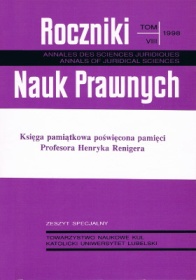Financial Independence of Communes vs. the Tax System in Poland
Abstract
The re-introduction of territorial self-government in Poland has not been accompanied by a change of the tax system. An organic unity of the system of public finances has been preserved, a unity which leaves a vary narrow range of tax power to communal organs. The author formulates a thesis that a considerable change of the system of public revenue should be made. A new system might be based on the principle of community or separation of the sources of public revenue or be a mixed system. According to the author, due to the experience we have had so far, a mixed system should be accepted. Moreover, it is necessary to remove some taxes of very little effectiveness − the fact which will allow us to simplify the tax system − and to restore a real economic significance of other taxes. The self-government taxes should be the following: agricultural tax, income tax on physical and legal bodies (but only on the profits from specialistic agricultural production), inheritance and gift tax, stamp duty and local tax. Furthermore, communes should obtain shares in the value added tax (VAT) and excise tax.
Copyright (c) 1998 Roczniki Nauk Prawnych

This work is licensed under a Creative Commons Attribution-NonCommercial-NoDerivatives 4.0 International License.


